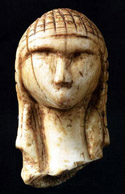Anthropology, Department of

Department of Anthropology: Faculty Publications
Document Type
Article
Date of this Version
May 1978
Abstract
The !Kung are a provocative case study: a controversy exists as to whether they are harmless or, in fact, murderous. In addition, since the !Kung are by now well studied, one can use specific information about !Kung behavior to examine general propositions about social control and interpersonal conflict in hunting and gathering societies generally.
This paper will address the question of interpersonal conflict and aggression among !Kung, with particular emphasis on the learning environment of children and how it relates to the learning of aggressive behavior. Of concern here will be parental attitudes toward children’s behavior and techniques for dealing with conflict. In the !Kung case there are many factors such as settlement pattern, economy, and the value of sharing which are less obviously related to values about child-rearing but which have substantial impact on the social and emotional climate in which children are reared. This paper will describe, therefore, not only some aspects of child socialization that bear on the teaching of non-aggression, but also these other dimensions of social organization which are relevant to the ability of !Kung to discourage interpersonal aggression and to encourage group cooperation. I will leave a discussion of the issue, “Are the !Kung unaggressive, aggressive, harmless, or murderous?” to the concluding section of this paper.


Comments
Published in Learning Non-Aggression: The Experience of Non-Literate Societies, Ashley Montagu, ed. New York: Oxford University Press, 1978. Pp. 31–53. Copyright © 1978 Ashley Montagu. Used by permission.